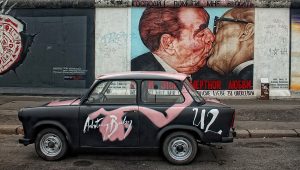(THIS ARTICLE IS MACHINE TRANSLATED by Google from Norwegian)
Let's start with Sorina and Paul. Today a married couple living in Budapest, but it could have gone very differently. Sorina grew up in Romania under Ceaucescu. Paul lived his youth life in West Germany. They meet when Paul is vacationing on the Black Sea. It's the kind of love that just breaks down all of a sudden. Is unstoppable and pervasive.
But love under communist rule is not necessarily possible, and not at all with a westerner. Sorina can't forget Paul, and she throws herself into a risky escape with fake Cuban passports and an awful lot of things that can go wrong. And it does. She is detained and smoked in jail, where she shares a cell with a 20-year-old woman who has killed her baby in desperation. There is cold and hunger. The dogs get better food than the women.
'I can't understand the nostalgia. It is probably the lazy and the stupid who miss it
time."
But after three months, Sorina is allowed to leave prison. It comes unexpectedly and only later does she find out that her mother has bribed the judge and thus probably saved her daughter's life. Years later, she also finds out that the mother has been paid by the state to oversee her daughter, thus tarnishing the love that might have been. However, the story ends halfway happily, because after living separate lives, raising families and having children with other people, Paul and Sorina reunite after 25 years and now live together in the apartment in Bucharest.
The story is very telling We were the people. A book that will approach an understanding of the people we rarely hear about in the larger media, unless you just have to use an ordinary person to make it all more appetizing and understandable. IN We were the people here are basically just ordinary people. It is their life that is at the center of it all.

A journey of good time
The basic idea behind the book is very simple. Thomas Ubbesen, who for many years has been a foreign reporter at Denmark's Radio, has been traveling in what we once called Eastern Europe. With him is his wife Anne, who is also a journalist. Together they have set out a route that will lead them in the countries and regions which until 1989 were under communist rule..
The tour gives us plenty of time. Time to listen and get into the life of the various destinies. The travel couple is in no hurry. They stay stuck until the tale can no longer be stretched.
There is a certain amount of repetition in the book. Partly, there is a monotony in the nature of the journey. Check out, check in. Go on. New hotel. New restaurant. New taxi. Fortunately, Ubbesen and wife are good at talking. Yes, in fact, the book can almost be read as a tribute to the bliss of marriage. They both have a great deal of knowledge and are good at reflecting and discussing together in such a way that we readers become wiser as well.

Another monotony that is more difficult to drown out is the many similarities that arise when one has so many geographical impacts as is the case in We were the people. So different are people's lives, whether they live in Odessa, Krasnodar or Bialystok. Often you end up with the feeling that the Eastern Europeans, Ubbesen and wife meet on their way, can be grouped in two. There are those who miss the old days. Which seems easier then. That there was another form of solidarity and that there was work for everyone. And then there are those who think that modern times are preferable. That you can now travel freely, live your dreams and not be subject to a tight grip of a government. Or as Bulgarian Margarita puts it: “I can't understand the nostalgia. It is probably the lazy, and the stupid ones, the ones who do nothing themselves, but want the whole system fed up with that time. Our Lord be preserved! ”
The thing is, of course, that those who like the new era are typically the ones who did well, whereas the poor and the disadvantaged had a different kind of support and role to play in communist society. They yearn back.
wall
We were the people works especially as a human being. The major perspectives and the in-depth historical communication must be found elsewhere. The book is thought-provoking in the sense that, through the many stories, it embodies how much importance it has had, whether one is on one side or the other of , clean. At the same time, it is nuanced enough that it does not become a unique West-East tale in favor of the West. The kind of shades we need.


